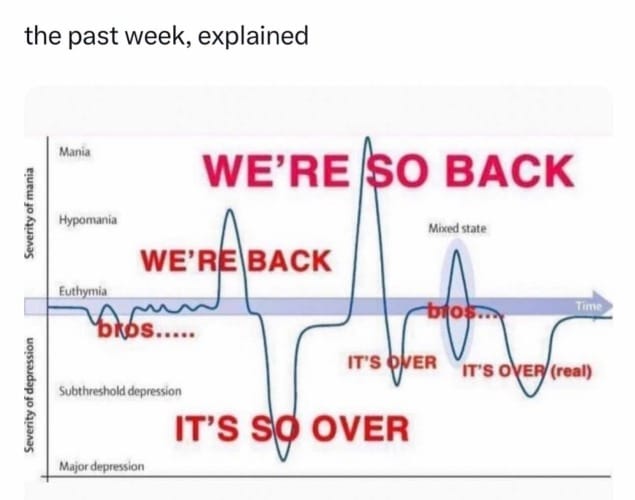Investing in unpredictable markets: strategies for long term investing
Ever feel like the stock market is a rollercoaster you didn’t sign up for? Buckle up—you're not alone.

We’re living through a period of unprecedented change— tariffs this, tariffs that. One day you're 20% down, the next you’re probably down again.

Volatility is off the charts, and navigating the stock market has never felt more unpredictable. If you're as invested in this wild ride as I am, pull up a chair and join me as I reflect on these fascinating times (with a personal investing story towards the end!). And I’m fortunate enough to be joined by two guests who need no introduction (ok maybe some).
Firstly, I am joined by a fellow investor, Ed Cooper. Ed has been investing and intra-day trading in the markets for 8 years. Ed, what's your thoughts on dealing with volatility in the markets?
Markets are unpredictable, especially when caused by one man, DJ Trump. For me, the most important lesson is patience and buying companies with a positive outlook.

Fundamentally, the markets experience a correction of at least 10% approximately once every 19 months. And while the past doesn’t dictate the future, on average 5 years after a 10% drop the market typically shows an average gain of approximately 64%. So, despite unsettling market corrections, they are often followed by periods of recovery and growth.
Remember, facts over fear, strategy over emotion.
I agree Ed. In these fearful times, it feels like you just need to take a step back and look at things with some perspective. Thankfully we are joined by Damien Nguyen who brings alot of perspective.
Damien is an Investment Adviser at Morgans Financial Limited and provides strategic investment advice to business owners and self-funded retirees.
Stay calm and avoid panic selling
Market turmoil can often spark fear and panic, but it is important to remain calm. Emotional decisions, like selling investments out of fear, can lock in losses that might have been avoidable once the market rebounds and moves higher.
It is easy to let emotions drive poor decisions, especially when fear sets in. Selling during a correction may seem like a way to avoid further losses, but it often results in realising those losses instead or paying unnecessary tax on capital gains.
Stay committed to your long-term plan and avoid hasty moves.
The long-term benefits of market corrections
While the short term impact of a market correct can be intimidating, the long term benefits are significant. Corrections allow the market to reset, eliminated overvalued stocks and creating a healthier investment environment.
For investors, this means potential for growth. By staying disciplined and sticking to an investment strategy, you can turn market corrections into opportunities to strengthen your portfolio.
Remember, the key to successful investing lies in staying informed, remaining patient, and seizing opportunities when they arise.
Stick to your investment plan
Sticking to your pre-determined investment strategy ensures your actions align with your financial goals, risk tolerance and time horizon.
Emotional decisions often lead to selling low and buying high, which goes against sound investment principles. Remember, investing is a long term endeavour. Market corrections are temporary setbacks in the overall growth trajectory.
Historically, markets rebound and continue to grow over time, so maintaining a long-term perspective helps you stay focused during these periods.

Thanks Damo. Clearly it looks like we need to take a longer term perspective and in my opinion it's important to plan your execution strategy. And boy do I have a story for you guys.
I still remember it like it was yesterday - the summer of 2019, December to be precise. Christmas joy filled the air, Lizzo was smashing the charts and the scent of avocado smashes and economic optimism drifted through the streets of Naarm.
I had been dabbling in investing for a while, casually, like one might flirt with the idea of running a marathon—often in theory, rarely with conviction. Most of my savings sat in a “high-interest” account so unremarkable, it might as well have been a sock under my bed.
But the market was euphoric. Records were breaking. Charts were climbing. And I, too, was caught in the wave. “If I’m in this for the long game,” I told myself, “why not start properly?”. So I did. I took 90% of my savings and cast it across my favourite stocks with the confidence of a man who had seen one too many TED Talks.
For a few glorious weeks, I was invincible. Returns were green. My confidence swelled. I felt like Warren Buffet, I was close to calling myself the “Miracle of Melbourne” at one stage.
Then February hit. I heard something about bats. Something about Wuhan. It felt far away, until it wasn’t. One morning, I opened my portfolio and stared into the abyss. Down 30%.
One word echoed in my mind. It started with “F” and rhymed with FUCKKKKKKKK.

"Why me?" I asked the ceiling. Out of all the months, all the years, I had picked the moment. The very peak. The market had smiled politely, then slammed the door in my face.
And in those quiet, humbling weeks that followed, a single thought played on loop in my mind: Maybe I should’ve DCA’d.
What is Dollar Cost Averaging (DCA), and why do so many investors swear by it?
DCA is an investment strategy where you invest a fixed amount of money at regular intervals—say, monthly—regardless of whether the market is up or down. The idea is simple but powerful: by consistently buying in over time, you average out the cost of your investments and reduce the risk of making a poorly timed lump-sum investment (like yours truly).
Let’s say you invest $200 into a broad-market ETF every month. When the market is high, your $200 buys fewer units. When it’s low, it buys more. Over time, this helps you avoid overpaying, while also building discipline into your investing habit.
Think of it like filling your car with fuel every week. Prices fluctuate, but by topping up regularly, you avoid the stress of guessing when petrol will hit its lowest point. Similarly, with DCA, you’re not trying to predict market bottoms—you’re committing to a long-term plan.
So what now? If you're sitting on a lump sum and thinking of going all-in, take a breath—what’s the rush? If you’re in it for the long run, spacing it out won’t hurt. In fact, it could save you from watching your portfolio nosedive overnight. Try splitting it into six parts and investing monthly. It’s not about timing it perfectly—it’s about easing in smartly.
Final thoughts
On March 23rd, 2023, I shared the top lessons I’ve learned from eight years of investing. As I revisit those notes and what Ed and Damo have shared today, I’m thankful to see that the core principles I wrote about still hold true. In fact, despite all the recent market corrections, if you had invested in the S&P 500 between the time I wrote that article and time of writing (April 14th), you would have seen a 35.1% return. A testament that these rules have endured.
Some of the key lessons that remain as relevant as ever are:
- Its about getting started
- Its about investing in small increments
- Markets are just noise
- It’s impossible to catch the bottom
- Its about putting money you aren’t afraid to lose and thinking long term
- Patience is key
Thanks for joining me on this ride and thank you Damo and Ed for your features 😉 Let me know if you want to see them again!
Disclaimer: Any advice in this blog should not be taken as constituting professional advice. Simon Bui Tran and his associates are not financial advisers (except for Damien Nguyen - however his advice is this blog should not be taken in the capacity as a financial advisor). You always should consider seeking independent legal, financial, taxation or other advice to suit your unique circumstances. Simon Bui Tran and associates are not liable for any loss caused, whether due to negligence or otherwise arising from the use of, or reliance on, the information provided directly or indirectly, by use of this website.

